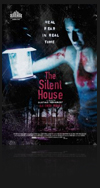
| Capsule Review
The Silent House
(La casa muda) (2011)

Directed by Gustavo Hernández.
Cast: Florencia Colucci, Abel Tripaldi, Gustavo Alonso, María Salazar.
2011 – 89 minutes
Not Rated (equivalent of an R for violence and sexual images).
Reviewed by Dustin Putman, May 18, 2011.
|
"The Silent House," or "La casa muda" in its native Uruguay, is notable more for its impressive technical prowess than its story or characters. As directed by Gustavo Hernández, the film is told in real time and consists of a single, unbroken shot. With the exception of just one or two possibly sneaky places where the image goes completely dark and could, in fact, signify a cut, Hernández has mastered what must have been a daunting undertaking. Because the premise and the payoff are decidedly weak, however, this stylistic angle also comes off as a gimmick used to occupy the viewers' attention and keep them from stopping to think about how flimsy the script (credited to Oscar Estévez) is.  |
The plot is as simple as they come—at least in its setup—inviting any number of holes to shine through under the faintest of scrutiny. Laura (Florencia Colucci) and her father Wilson (Gustavo Alonso) have arrived at a broken-down house in the country with the intention of fixing it up so that owner Néstor (Abel Tripaldi) can put it back on the market. The moment after Néstor has left, Laura and Wilson settle down to go to sleep in two uncomfortable living room chairs. Why didn't they just arrive the following morning? Why are they spending the night there when they clearly live nearby (they arrive to the home by foot)? Oh, and why is it still daylight outside? It isn't long before Laura hears alarming noises coming from upstairs. When Wilson goes to investigate, he returns bound and bloodied and mortally wounded. Who, or what, is in the house with them?  |
In "The Silent House," Laura wanders around the dim, dank interiors of the title setting, ad nauseam. Why she is doing this when her father has just wound up dead is a mystery only partially explained away by the not-so-surprising but certainly contrived twist ending. Mostly, though, it's simply to pad the running time. Some tension creeps through as the audience waits for something to pounce, or at least happen. When it does, it's not nearly as disconcertingly disturbing as it should be. By the time Néstor comes back into the narrative and he and Laura re-enter the house for another spell of meandering around, it just becomes far-fetched and tedious. Who knew walking out the front door could be so hard?
|



